Startups don’t fail because they lack ideas — they fail because they can’t manage momentum.
I’ve built, scaled, and advised enough startups to know one thing: It’s not the best idea that wins — it’s the best execution.
If you’re pitching investors, building a product, and chasing early customers, you can’t afford to lose leads or drop the ball on follow-ups.
That’s where a CRM for startups becomes a non-negotiable tool — not just a “nice-to-have.”
It’s not just about storing contacts. The right CRM helps you build stronger relationships, automate repetitive work, and drive real growth — fast. In fact, startups using a CRM are 86% more likely to hit their sales goals.
In this blog, I’ll show you:
- What a CRM for startups really does (beyond just managing contacts)
- How it simplifies sales and client outreach
- The 11 best CRM tools that can help you organize, automate, and grow your startup in 2025 (and beyond)
Let’s dive in — and set your startup up for success.
What Is a CRM for Startups?
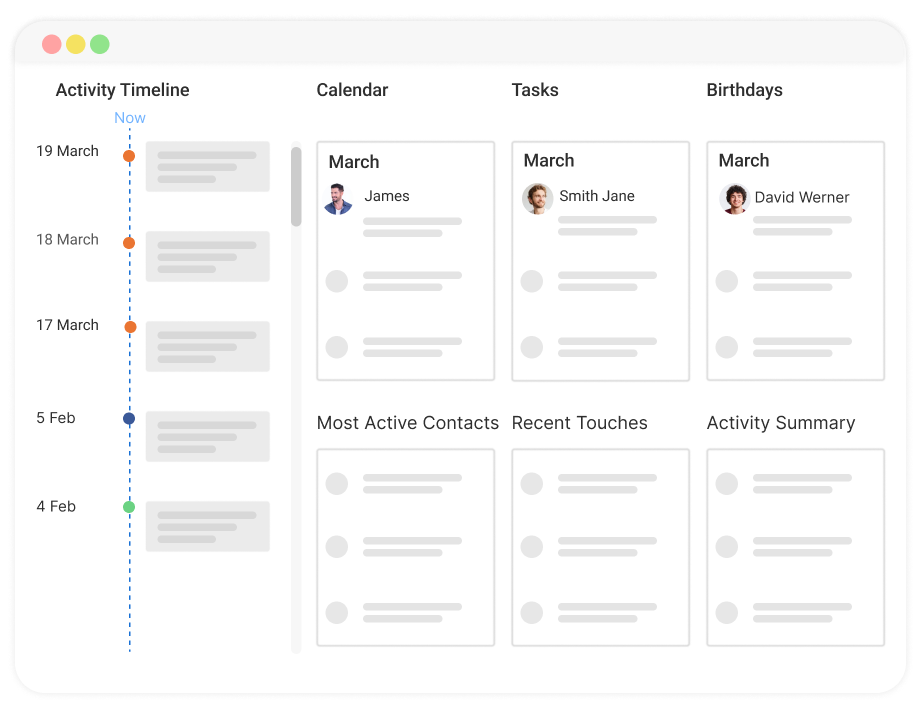
A CRM (Customer Relationship Management) system is a tool designed to help startups manage interactions with potential and current customers. It’s like having a smart assistant who remembers every lead, follow-up, and deal — all in one dashboard.
Instead of dealing with spreadsheets, sticky notes, and endless email threads, a startup-friendly CRM helps you:
- Stay organized with your contacts and conversations
- Track leads and sales pipelines
- Set reminders for follow-ups (because, yes, people forget)
- And even automate repetitive stuff like emails or data entry
In short: it helps you save time, close more deals, and build stronger relationships with your customers — without losing your mind.
Quick Overview: My Top 3 CRM Picks for Startups
If you are short on time, here’s a quick look at my top three picks from the list –
1. BIGContacts: Best for small businesses and startups looking for a simple CRM tool that maximizes the effectiveness of their contact management, email marketing efforts, and outbound sales.
2. Keap: Best for startups aiming to automate marketing and sales processes for better lead nurturing and conversion. However, it can get expensive for smaller teams once you need advanced features.
3. Bitrix24: Best for startups with remote teams looking to enhance team collaboration. Although, its interface can be overwhelming for new users, especially those unfamiliar with such effective tools.
11 Best CRM for Startups in 2025
To compile this list, I evaluated each tool based on its ease of use and scalability, ensuring they cater to various startup needs. My assessment is based on personal experiences, insights from trusted reviews, and feedback from industry peers.
Here is a quick summary:
| Software | Best For | Pricing |
|---|---|---|
| BIGContacts | Contact Management & Email Marketing for Small & Medium Businesses | Forever free for small teams. Paid plan starts at $9.99/month. |
| Insightly | Integrated Marketing & Customer Service | Starts at $29/user/month. |
| Keap | Sales & Marketing Automation | Starts at $299/user/month. |
| Bitrix24 | Team Collaboration | Starts at $22.9/user/month. |
| Streak | Gmail Users | Starts at $59/user/month. |
| HubSpot | Centralizing Sales, Marketing, & Support Operations | Starts at $15/user/month. |
| SugarCRM | Marketing Automation | Starts at $19/user/month. |
| Pipedrive | Sales-focused teams | Starts at $14/user/month. |
| Monday | Visual Task Tracking | Starts at $12/user/month. |
| Salesforce | Large & Complex Sales Organizations | Starts at $25/user/month. |
| Zoho | Omnichannel Engagement | Starts at $14.8/user/month. |
1. BIGContacts – Best for Contact Management & Email Marketing for Startups & Small & Medium Businesses
I’ve used BIGContacts to manage customer relationships at my startup, and it’s been a genuinely useful tool for staying organized without overcomplicating things. The interface is clean and intuitive, which makes it easy to track contacts, conversations, and follow-ups — even across a small, fast-moving team.
What stood out to me was how seamlessly it blends email marketing with contact management. I could launch campaigns, set reminders, and automate follow-ups — all from one place. The ability to build custom fields and workflows meant I could tailor it exactly to how we worked, not the other way around.
Setting up a simple sales pipeline, automating routine tasks, and pulling quick reports gave me more control over our process without drowning in admin work. If you’re at an early stage and need a solid foundation to manage leads, nurture relationships, and grow consistently, BIGContacts is a strong place to start.
What You’ll Like:
- Capture, organize, and segment contacts using custom fields, tags, and lists
- Automated drip campaigns to deliver the right message based on your contacts’ behavior and actions
- Customizable sales pipeline with an easy drag-and-drop interface
- Reports and analytics tools to help analyze data for business insights, customer behavior, and trends
- Awesome human support 24/7 via phone, chat, and knowledge base
- The interface is user-friendly and helps in navigating easily
Pricing:
Forever free for small teams. Paid starts at $9.99/month.
Here is how Ewald Kubota, a leading agricultural and construction equipment company, streamlined its client management and boosted sales efficiency with the help of BIGContacts CRM.
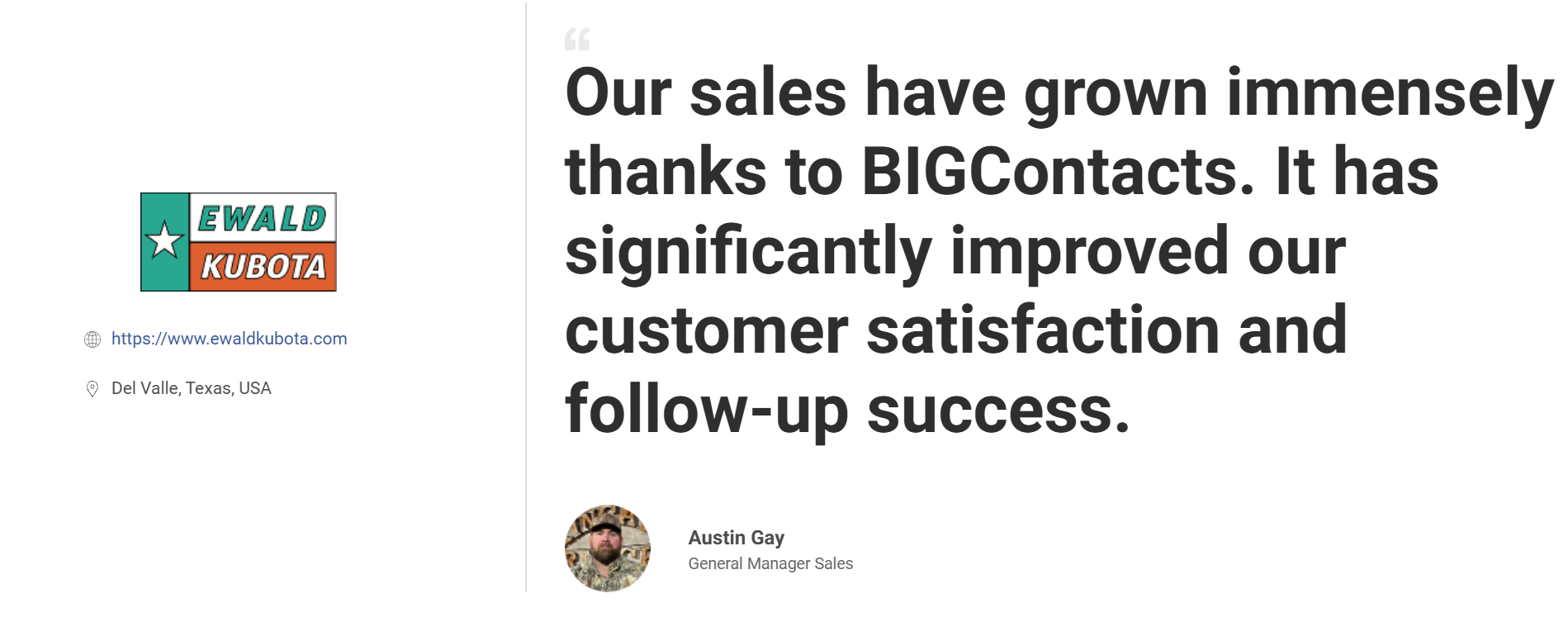
2. Insightly – Best for Integrated Marketing & Customer Service
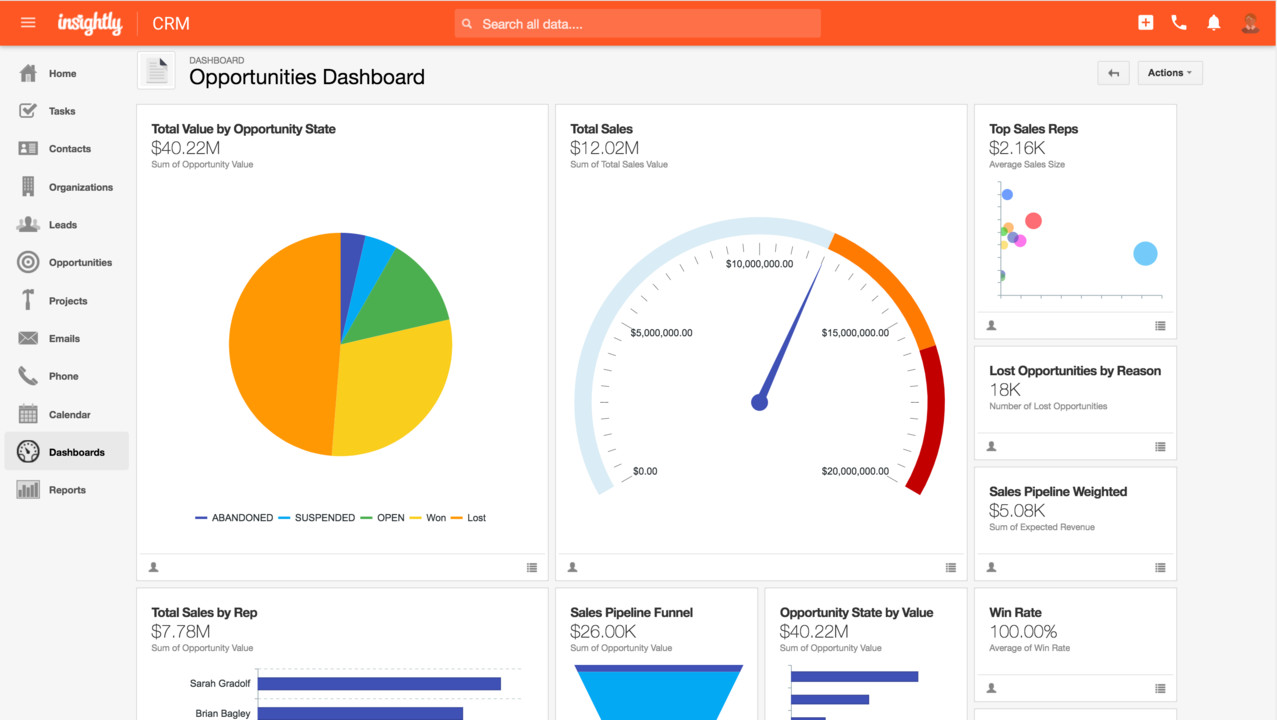
Image Source: LinkedIn
I’ve had the chance to use Insightly for streamlining both my marketing efforts and customer service operations. As a startup, managing both seamlessly was crucial, and Insightly really delivered. I loved how it combined CRM with project management, helping me to track customer interactions and the status of ongoing tasks.
The marketing automation features helped me create and schedule campaigns, while its customer service tools ensured I never missed an issue. The ease of use and integrations with other tools made it perfect for my growing team.
With Insightly, I could build stronger relationships with customers while also keeping everything organized. Whether it’s handling leads, automating marketing, or responding to customer inquiries, this CRM has been a solid choice for my startup.
What You’ll Like:
- Customizable Pipeline to match your specific business process, making tracking leads and deals more efficient
- Email Tracking and Automation to set up automated email sequences and track their performance
- Task and Project Management to manage tasks and projects within the CRM, ensuring smooth coordination between teams
- Integrations with popular tools like G Suite, Microsoft 365, and MailChimp to keep everything in sync
Pricing:
Starts at $29/user/month.
3. Keap – Best for Sales & Marketing Automation
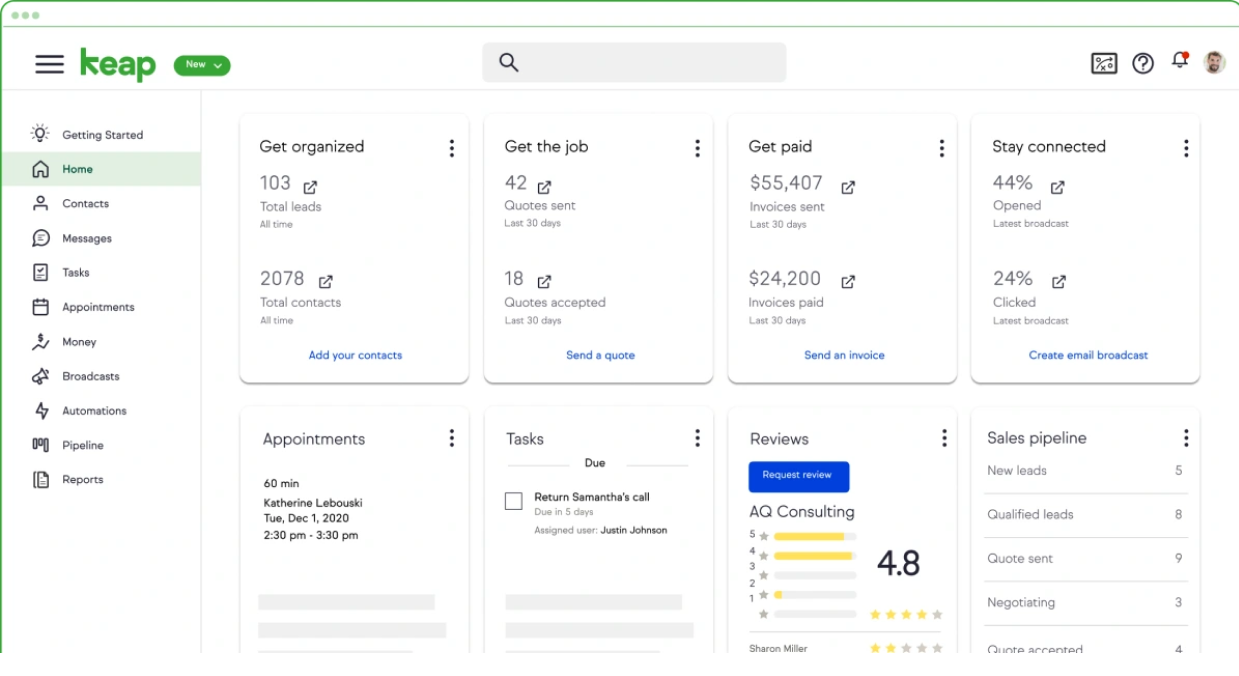
Image Source: Keap
After using Keap for a while, I found it to be an invaluable tool for managing both sales and marketing tasks in one place. As a startup, juggling sales leads, managing customer follow-ups, and running marketing campaigns simultaneously can get overwhelming, but Keap simplified everything.
I was able to automate email sequences, set up follow-up reminders, and track the performance of my marketing campaigns effortlessly. Keap’s intuitive dashboard made it easy to view and manage my sales pipeline, while the automation features helped me to create personalized workflows, saving me time and reducing manual effort.
One of the features I loved most about Keap is its ability to automate not only email campaigns but also text message marketing and lead capture forms. These tools nurtured leads efficiently, moving them down the sales funnel without missing a beat.
What You’ll Like:
- Marketing automation tools make it easy to nurture leads and send targeted email campaigns
- Customizable forms and landing pages to help capture leads and grow your customer base
- Built-in invoicing and payment integration to streamline transactions, reducing manual work
- Pre-built marketing automation templates to save time and help launch campaigns faster
Pricing:
Starts at $299/user/month.
4. Bitrix24 – Best for Team Collaboration
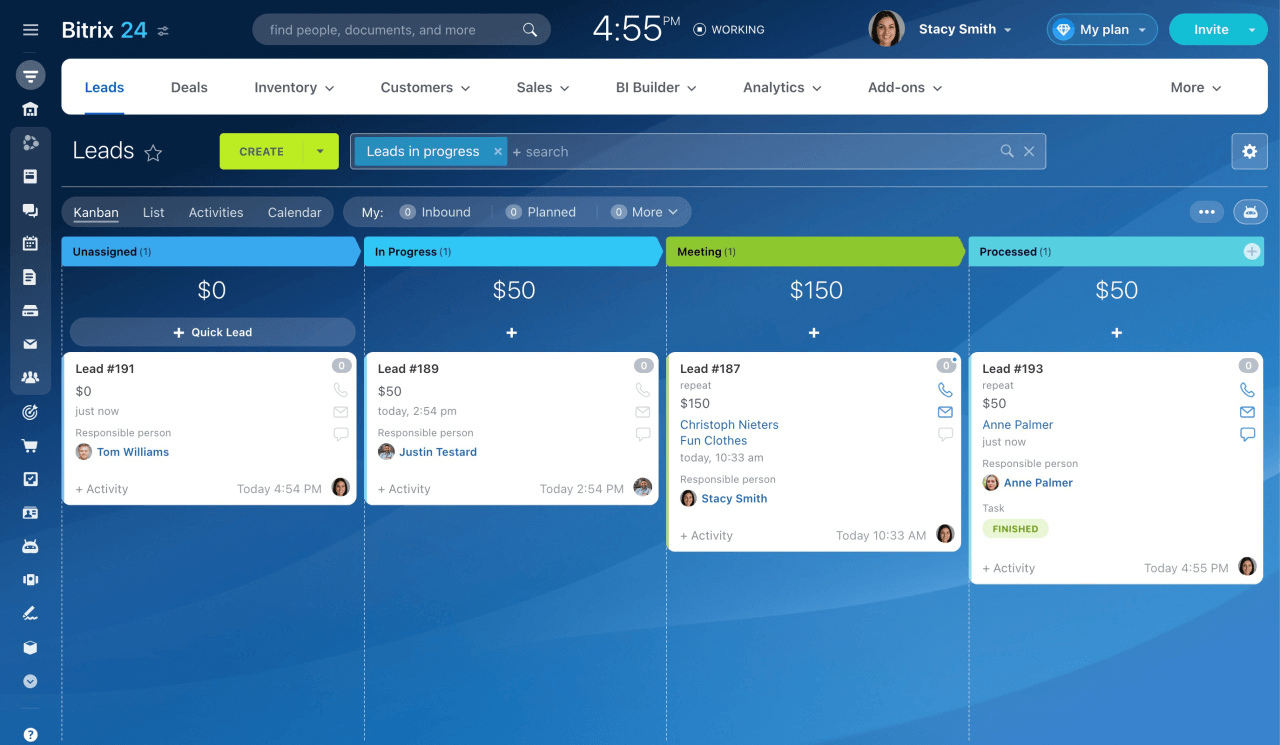
Image Source: Bitrix24 Helpdesk
After trying out a bunch of tools, Bitrix24 really stood out to me. It didn’t just help with managing leads; it brought everything under one roof: project management, team chats, video calls, tasks, and of course, the CRM.
What I appreciated most was how it supported real-time collaboration. Whether we were assigning tasks, sharing updates, or jumping on quick video calls, everything flowed smoothly. The customizable workflows and automation features also made a big difference — we could automate repetitive steps and focus more on growing the business.
If you’re looking for a CRM for startup, Bitrix24 is a suitable choice. It combines the essentials — like contact tracking and pipeline management — with powerful team tools like shared calendars, internal messaging, and task tracking.
What You’ll Like:
- Powerful online store builder with extensive customization features
- User-friendly mobile and SEO-friendly templates for developing websites
- Extensive no-code robotic process automation (RPA) for automated workflows
- Easy team collaboration with chat, video calls, and shared calendars
Pricing:
Starts at $22.9/user/month.
5. Streak – Best for Gmail Users
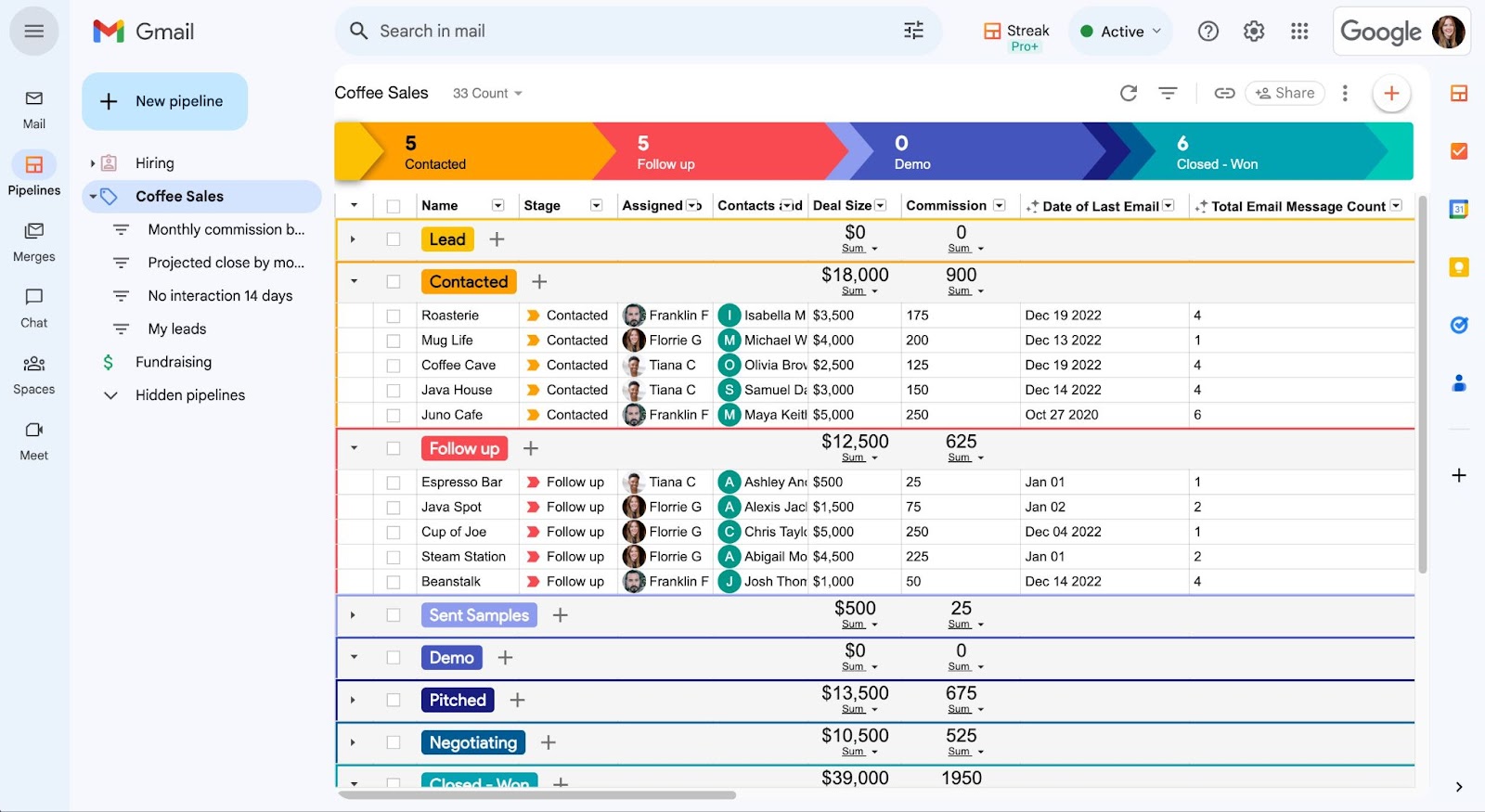
Image Source: Streak
I’ve been using Streak for my startup, and I must say it’s an absolute helpful tool for anyone who relies heavily on Gmail. The integration is seamless—it feels like an extension of my inbox rather than a separate tool.
I can manage my sales pipeline, track customer service requests, and even oversee hiring processes without leaving Gmail. The best part is how customizable it is. I created multiple pipelines tailored to different needs, whether it was tracking leads, managing support tickets, or overseeing internal tasks.
For startups, time is always limited, and Streak really helps streamline operations by putting everything I need in one place. I could automate follow-ups, set reminders for important tasks, and even track when my emails were opened. It’s especially handy for anyone already using Gmail because everything is integrated smoothly.
What You’ll Like:
- Offers “Send Later” feature to perfectly time your communications with clients
- Use of ‘Snippets’ for pre-saved email templates for quick responses
- Provides a powerful AI co-pilot for your CRM activities
- “Thread Splitter” feature to separate different conversation threads efficiently
Pricing:
Starts at $59/user/month.
6. HubSpot – Best for Centralizing Sales, Marketing, & Support Operations
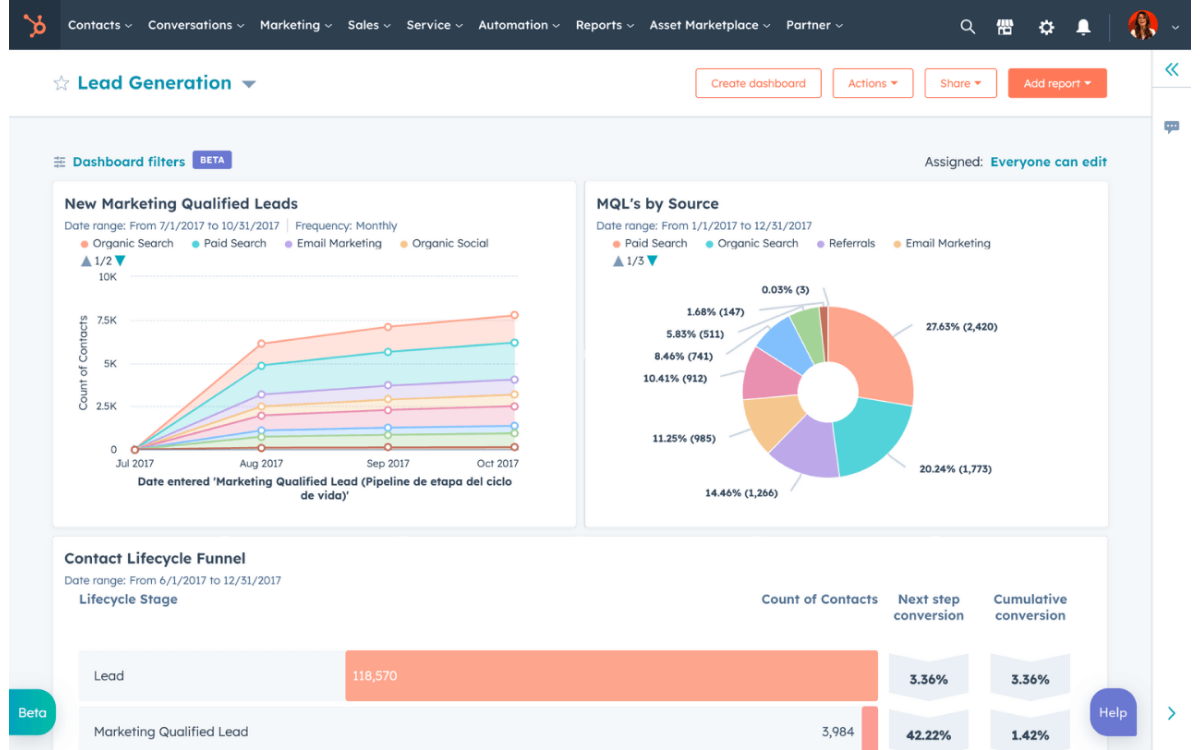
Image Source: HubSpot
I started using HubSpot to manage sales and marketing for my startup, and it turned out to be a really practical solution. The CRM made it easier to keep track of leads, set up simple marketing workflows, and handle support tickets — all in one place.
What helped most was how everything connected — sales, marketing, and support tools worked together without much setup, which made collaboration smoother for the team. The free plan also covered a lot of what we needed in the early stages, like contact management, follow-up automation, and basic reporting.
Overall, HubSpot worked well for us because it was easy to get started with and flexible enough to grow alongside our business needs.
What You’ll Like:
- Drag-and-drop email builder to create engaging, professional campaigns without coding
- Built-in SEO and content tools to help optimize marketing efforts, driving more organic traffic
- AI-powered chatbots to handle customer queries instantly, reducing response time and improving engagement
- Automated lead scoring to help prioritize high-intent prospects, improving conversion rates
Pricing:
Starts at $15/user/month.
7. SugarCRM – Best for Marketing Automation
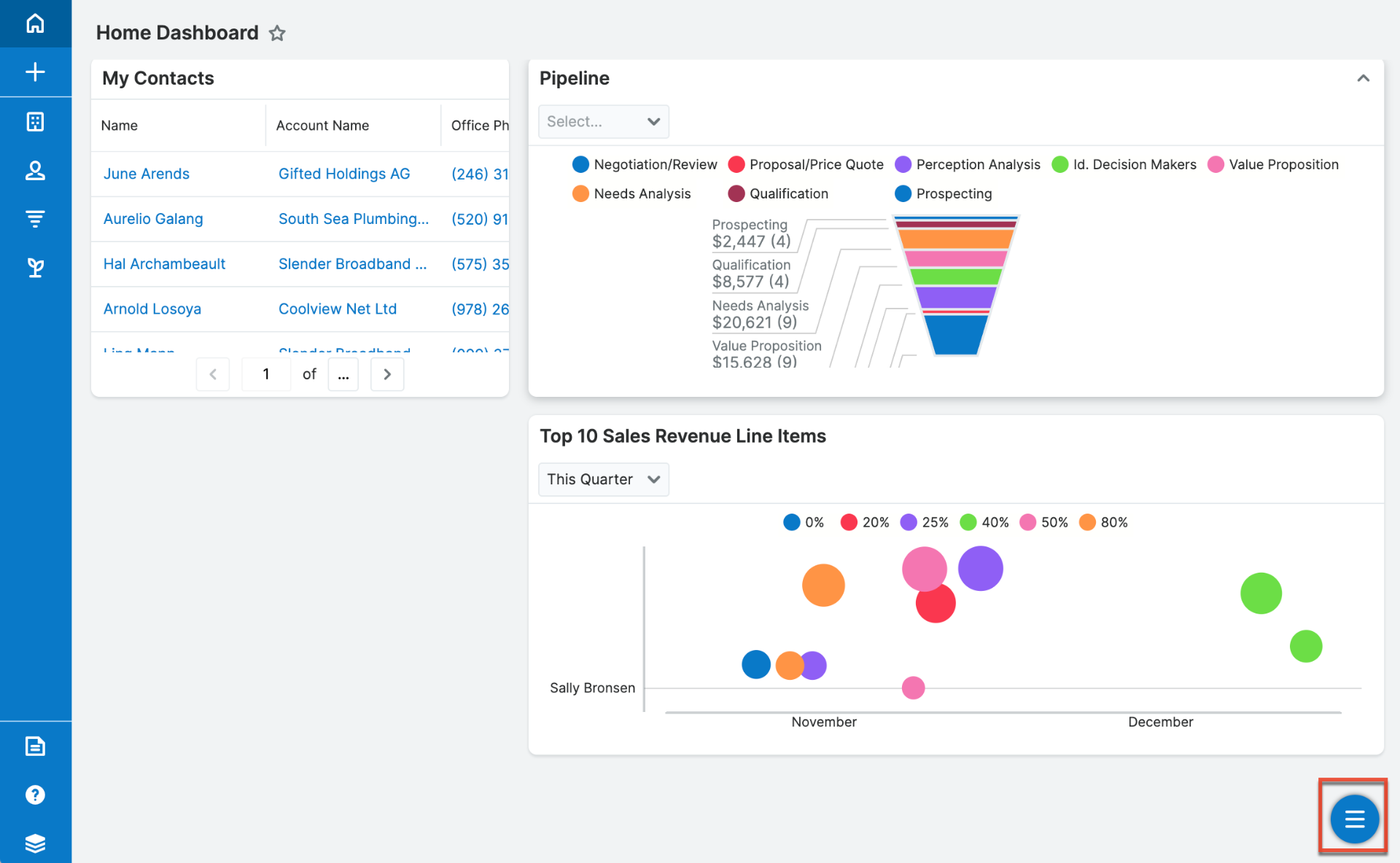
Image Source: Sugar CRM
I’ve been using SugarCRM for automating marketing tasks, and it has truly transformed how we handle customer engagement. As a startup, I needed a tool that could help streamline our marketing efforts without overwhelming our small team.
SugarCRM helped us set up automated email campaigns, track leads, and manage customer journeys all within one platform. The best part is that it integrates deeply with our CRM, so we could not only track where customers are in the sales funnel but also personalize their experience based on interactions.
What I really loved was its marketing automation tools—setting up triggered workflows based on customer behavior was quite helpful. SugarCRM also offers powerful reporting and analytics features that help me gauge the success of campaigns and adjust strategies accordingly.
What You’ll Like:
- Advanced email marketing automation to easily set up and track automated campaigns to nurture leads
- Unified customer view to track and manage every interaction, from first contact to conversion, to deliver personalized service
- AI-powered insights to get predictive recommendations and understand trends for better decision-making
- Lead Scoring to automate lead qualification by assigning scores based on customer interactions, helping you prioritize high-value leads
Pricing:
Starts at $19/user/month.
8. Pipedrive – Best for Sales-focused Teams

Image Source: Pipedrive
I started using Pipedrive to manage my startup’s sales process, and it turned out to be a really effective tool for keeping things simple and structured. What I appreciated most was the visual layout — I could see exactly where each deal stood, which made it much easier to stay organized and avoid missing any follow-ups.
For a startup, managing sales without unnecessary complexity is important, and Pipedrive struck a good balance. Automating tasks like reminders and follow-ups saved time and let me focus more on actually closing deals. The built-in reports and real-time insights also helped us figure out what was working and where we needed to adjust.
If you’re looking for a CRM for small business needs, especially when you’re just starting out, Pipedrive is worth considering. It’s easy to use, keeps your team on the same page, and has enough flexibility to support your growth over time.
What You’ll Like:
- Limited email templates and tracking to offer more advanced email marketing features
- Drag-and-Drop pipeline to easily move deals through different stages of your sales pipeline
- Customizable fields to fit your specific sales process, ensuring you capture all relevant details for better decision-making
- Email integration to streamline communication, track customer interactions, and ensure no follow-up is missed
Pricing:
Starts at $14/user/month.
9. Monday – Best for Visual Task Tracking
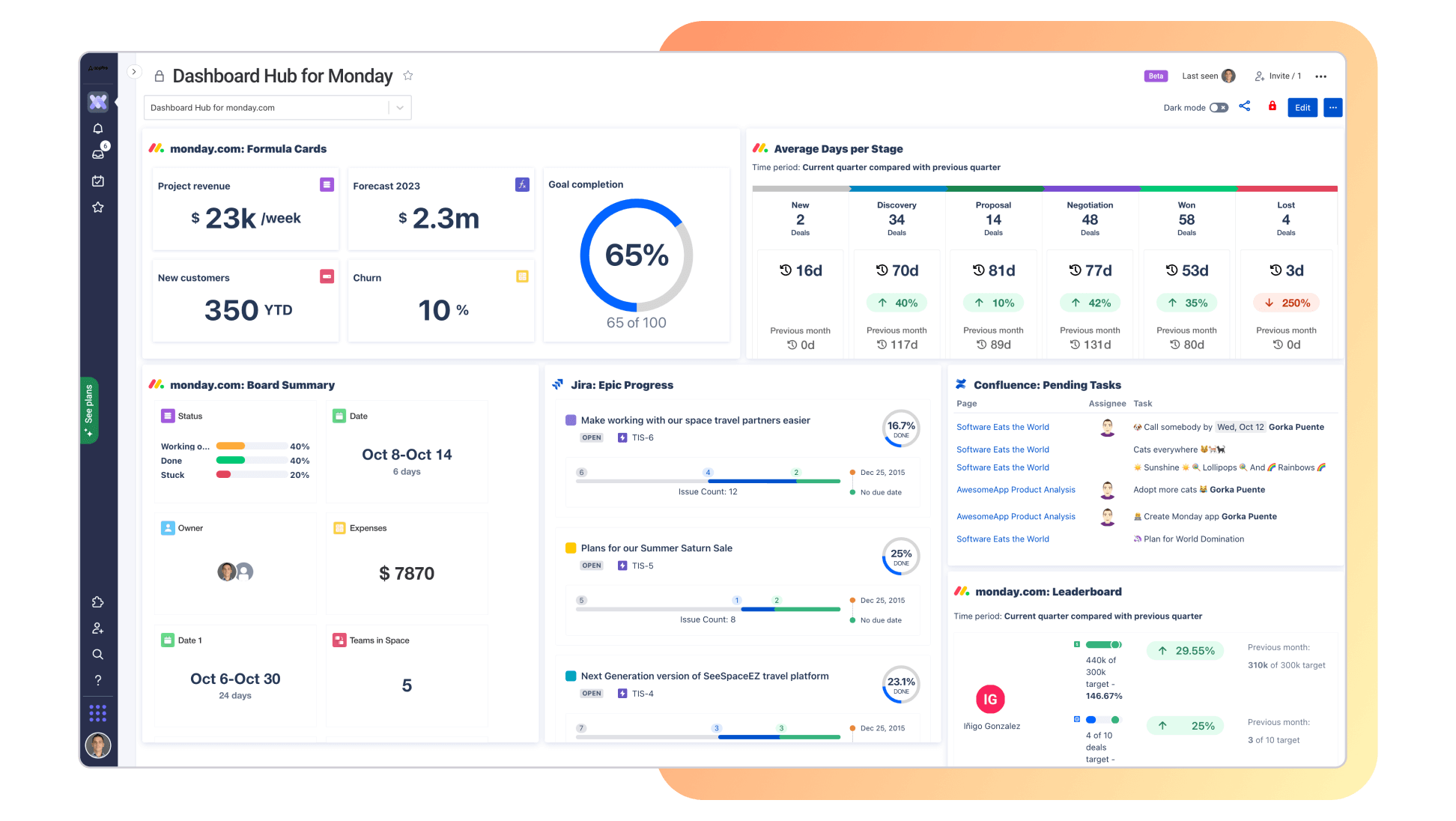
Image Source: Appfire
When I needed a tool that could keep up with the fast pace of our startup, I gave Monday.com a shot — and it quickly became part of our daily workflow. The visual boards weren’t just task lists for us — they became living dashboards where I could track every project detail in one place.
I used status tracking to see exactly where things stood, and I liked that I could add custom columns for the specific info we needed — not just the standard stuff. The automations were a big win too. I set up automatic status changes and notifications, which saved me a ton of time and let me focus on more important work.
What really surprised me was how useful the lead management features turned out to be. I could capture and organize leads quickly, and automating follow-up emails helped me stay consistent without having to think about it every day. It also made tracking conversations with potential customers a lot easier.
What You’ll Like:
- Built-in time tracking tools to monitor how long tasks take, helping you optimize workflows
- Custom views to switch between different views (e.g., Kanban, Gantt chart, calendar) to track tasks in a way that best suits your team
- Task dependencies to ensure the right order of actions, preventing bottlenecks
- Visual dashboards to get a comprehensive overview of your team’s progress through easy-to-read visual dashboards and charts
Pricing:
Starts at $12/user/month.
10. Salesforce – Best for Large & Complex Sales Organizations
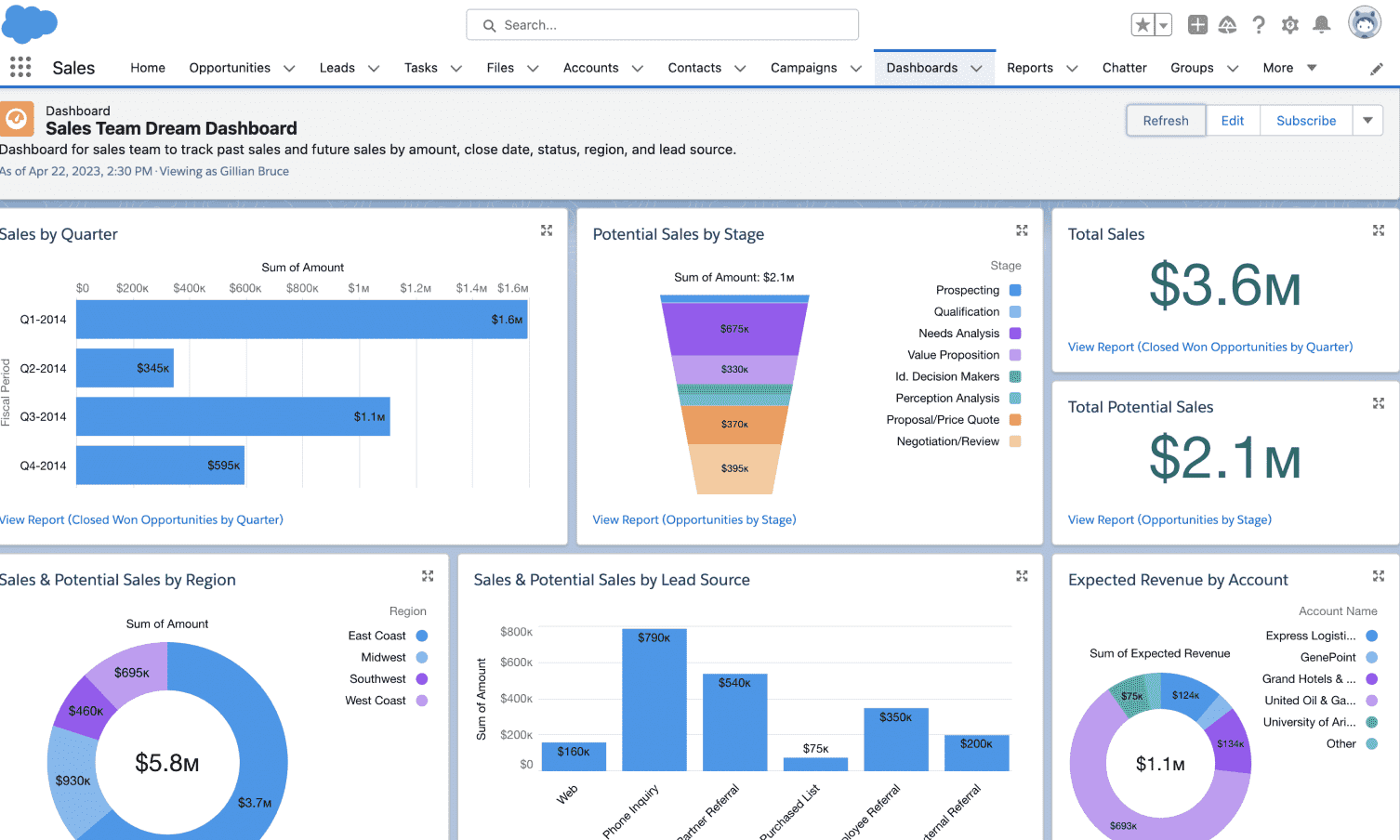
Image Source: Salesforce
I decided to implement Salesforce to manage my startup’s sales operations, and it was quite helpful for us. From the start, I was impressed with how customizable the platform is. I was able to design custom workflows, create tailored reports, and set up custom fields.
With features like task automation, follow-up reminders, and lead assignments, our team could focus more on selling rather than administrative work. The ability to integrate Salesforce with other tools like Gmail, Outlook, and even marketing platforms meant that we could maintain a unified view of our customer interactions across different channels.
Salesforce’s ability to adapt to our evolving needs and its extensive features made it one of the best CRM tools for startups. Whether you need advanced analytics, powerful automation, or flexible workflows, Salesforce offers all of these, making it the ideal tool for growing organizations.
What You’ll Like:
- Custom dashboards to tailor your dashboards to display the most important metrics, offering a quick view of key performance indicators (KPIs)
- Omnichannel support to manage customer interactions across multiple channels, including email, phone, chat, and social media, all in one place
- Salesforce Chatter enables team collaboration, allowing users to share updates, ask questions, and comment on sales opportunities in real-time
- Einstein AI provides predictive analytics to help you anticipate customer needs and make smarter decisions
Pricing:
Starts at $25/user/month.
11. Zoho – Best for Omnichannel Engagement
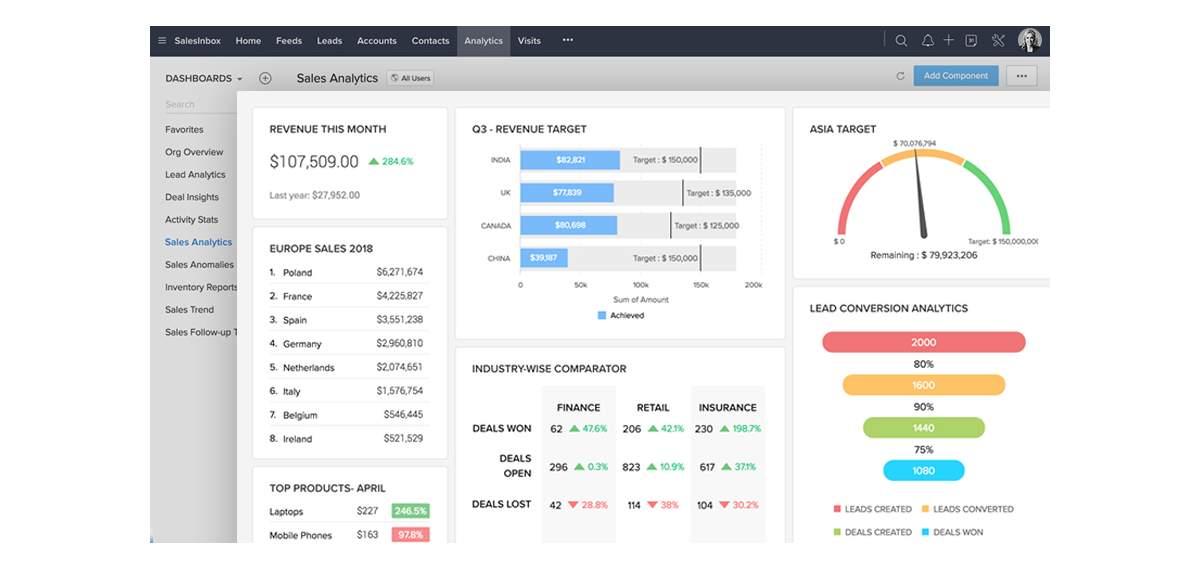
Image Source: Zoho
When I needed a way to connect with customers across different platforms, Zoho CRM became the tool I leaned on. What made a big difference for me was how it pulled together all our customer interactions — emails, social media messages, live chats, and even phone calls — into one place. It made it a lot easier to stay organized without bouncing between apps.
I set up automation to send personalized emails and follow-ups, which noticeably improved our response rates. It was also really helpful to build workflows that automatically assigned leads based on how they interacted with us. Getting real-time notifications about new messages or mentions meant I could jump in quickly and keep the conversation going.
I relied a lot on the multi-channel features to start building customer relationships early on. Being able to connect through social media, right inside the CRM, saved a lot of time. Plus, the lead scoring feature helped me figure out which leads were worth prioritizing — a huge help when every opportunity mattered.
What You’ll Like:
- Omnichannel communication integration for seamless customer engagement
- Customizable fields to create fields that fit your business processes, making it easier to manage data in a way that suits your needs
- Reports & analytics to track performance, providing actionable insights to improve your sales strategies
- Customizable dashboards to track important metrics and performance
Pricing:
Starts at $14.8/user/month.
What Are the Types of CRM for Startups?
Let’s break down the main types of CRM and how they can actually help you grow:
| Type of CRM | Focus Area | Best For |
|---|---|---|
| Operational CRM | Automating sales, marketing, and service tasks | Streamlining daily operations |
| Analytical CRM | Analyzing customer data for insights | Making data-driven decisions |
| Collaborative CRM | Improving communication across teams | Sharing customer information across departments |
| Strategic CRM | Aligning business strategy with customer needs | Building long-term customer relationships |
| Campaign Management CRM | Planning and tracking marketing campaigns | Optimizing marketing efforts |
| Free CRM | Providing basic CRM features at no cost | Startups on a tight budget |
What Are the Benefits of CRM for Startups?
Running a startup is exciting — but let’s be honest, it can get pretty overwhelming too. That’s where having a CRM really makes a difference.
Here’s how the right CRM can help you:
1. Keep Every Customer Conversation in One Place
Keeping up with every email, call, and social media message can feel impossible. A CRM pulls all your customer interactions into one place, so you get a full view of each person’s history, preferences, and needs. No more guessing. You’ll know exactly how to connect with them, and when.
2. Stay on Top of Your Sales Pipeline (Without the Stress)
If you ever feel like you’re chasing leads in circles, you’re not alone. A CRM helps you map out your sales pipeline clearly, so you always know where each deal stands. Plus, automation can handle follow-ups and routine tasks — giving you more time to actually build relationships instead of sending reminder emails all day.
Want to take it further? These CRM best practices can help you streamline follow-ups and close deals even faster.
Looking to Build a Custom Sales Pipeline?
3. Get Your Team Working Together
When everyone has access to the same customer info — sales, marketing, and support — things run a lot smoother. A CRM keeps your whole team on the same page, so you can work faster and avoid miscommunication or duplicate work.
4. Make Every Customer Feel Like a Priority
Customers want answers — fast. With a CRM, you’ll have all their details at your fingertips the moment they reach out. That means quicker, more personalized support, and happier customers who stick around.
5. Make Smarter Moves with Real-Time Insights
When you can actually see what’s working (and what’s not), it’s a lot easier to make smart choices. A CRM gives you insights into your sales, marketing, and customer service performance, helping you double down on what drives real growth.
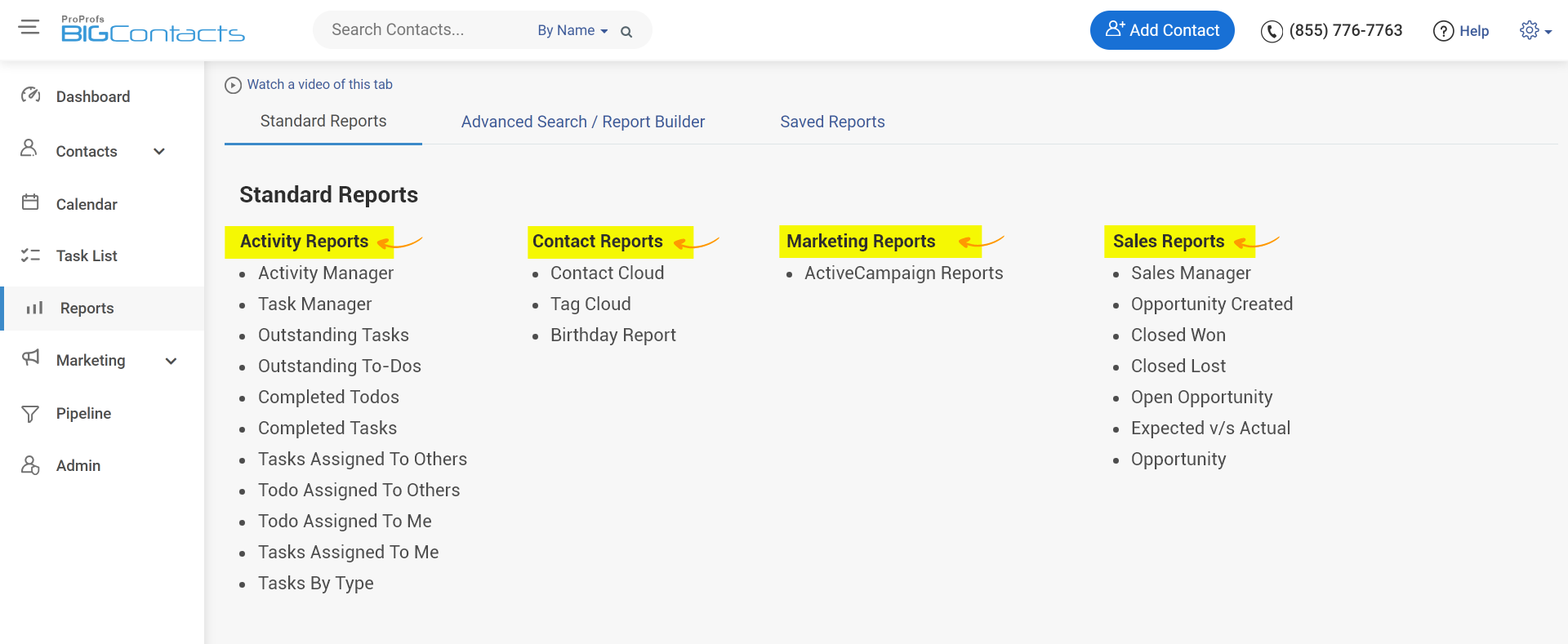
6. Set Yourself Up for Growth from Day One
Your startup isn’t staying small forever, and your CRM shouldn’t either. Investing early in an affordable CRM for startups means you’ll have a system that grows with you, without needing a painful (and expensive) upgrade later.
What Are the Essential Features of CRM for Startups?
When you’re running a startup, you don’t have time for complicated tools that slow you down. You need a CRM that actually makes life easier, not harder. Here’s a simple breakdown of the must-have features:
1. Contact Management
Your CRM should store everything — names, emails, phone numbers, even social profiles — in one easy-to-access spot. Even better if it lets you segment your contacts based on their behavior, interests, or demographics.
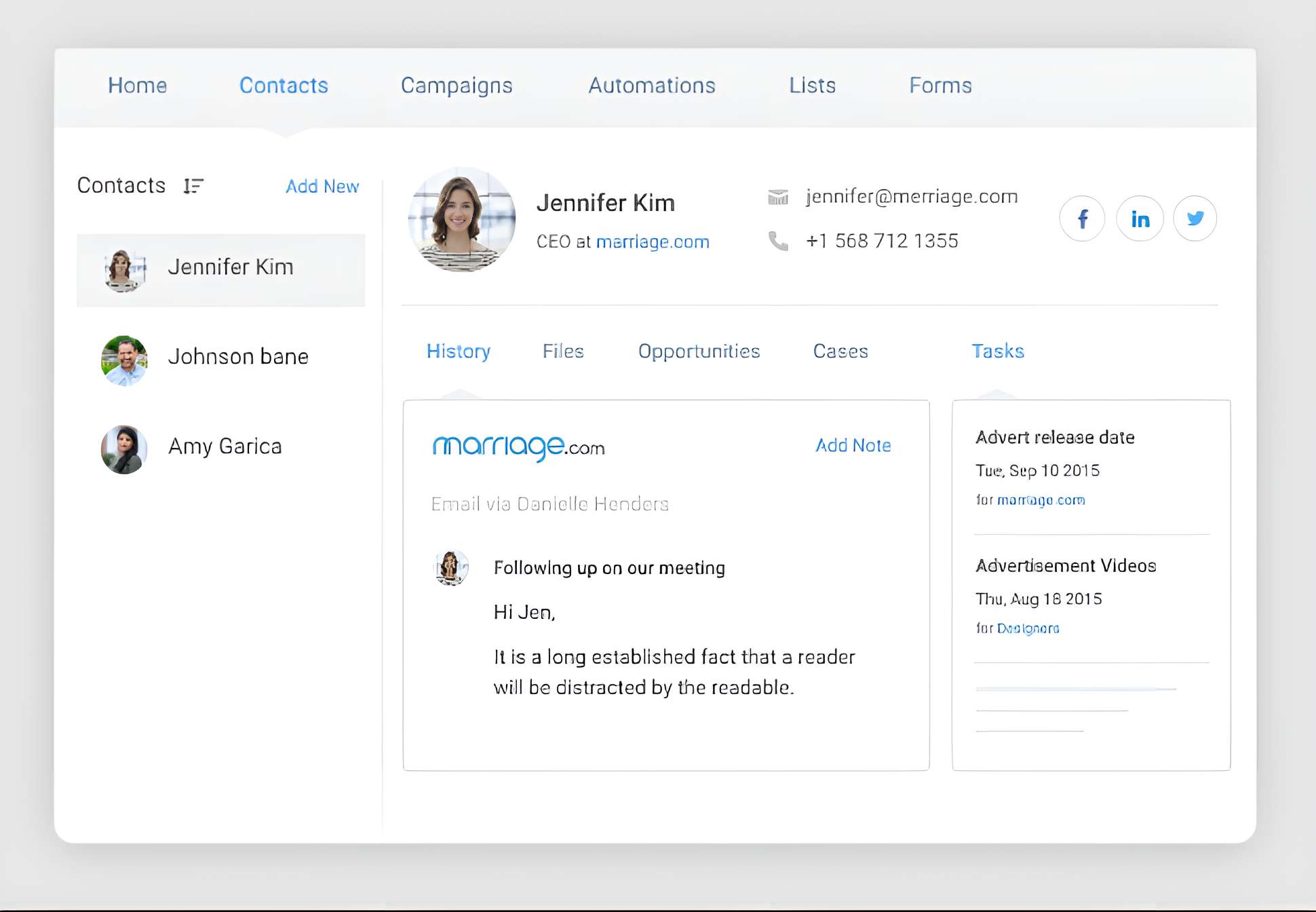
2. Sales Pipeline Management
No more wondering what happened to a lead. A good CRM gives you a clear, visual sales pipeline so you can track progress, spot bottlenecks, and keep things moving. Drag-and-drop tools make it even easier to manage deals on the fly.
Want to learn more about optimizing your sales pipeline? Check out this quick video:
3. Email Integration
Jumping between your inbox and CRM wastes time. Look for a system that connects directly with your email — letting you send, track, and automate follow-ups without switching tabs all day.
4. Task and Activity Management
Managing a startup means juggling a hundred tasks. A CRM should help you schedule calls, set reminders, track meetings, and stay organized — while also keeping your team aligned with collaboration features.
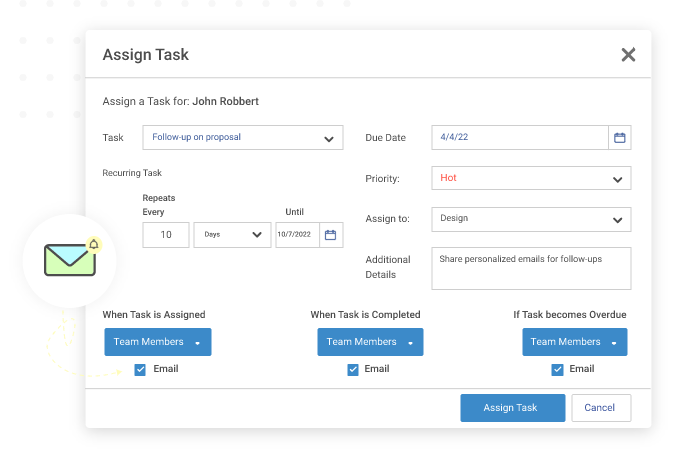
5. Lead Scoring
Not all leads are created equal. Lead scoring helps you figure out which prospects are most likely to convert, so you can spend your time where it matters most. Lead scoring helps you identify high-quality leads and boost your conversion rates by focusing on prospects most likely to buy.
6. Mobile Accessibility
You’re not always at your desk — and you shouldn’t have to be. A mobile-friendly CRM keeps you connected to your leads, tasks, and updates even when you’re on the move.
7. Integration with Other Tools
Your CRM should integrate well with the other tools you rely on — like marketing platforms, accounting software, and social media channels. Good integrations help you create a seamless, efficient workflow.
8. Reporting and Analytics
You can’t improve what you can’t measure. A startup-friendly CRM should give you simple, powerful insights into your sales, marketing, and support performance — helping you make smarter, faster decisions every step of the way.
How to Choose the Right CRM for Your Startup
- Focus on your needs: What’s the biggest pain point you need to solve right now?
- Think ahead: Will the CRM still fit your business as you grow?
- Try before you commit: Take advantage of free trials — they’re the best way to figure out what actually feels right for your team.
Want a little more guidance? Check out this quick video:
Boost Your Startup’s Success with the Right CRM Tool
Picking the right CRM isn’t just about adding another tool — it’s about finding something that actually makes your day-to-day work easier and helps you build stronger customer relationships. The six tools we’ve covered offer everything from advanced automation to simple, no-fuss contact management, depending on what your startup needs most.
If you’re just getting started and want something simple and affordable, BIGContacts CRM is worth checking out. It even offers a forever-free plan — perfect if you’re looking to manage contacts and sales without stretching your budget.
And as your startup grows, the good news is you won’t outgrow your CRM. You’ll be able to upgrade and tap into more advanced features when you need them.
The right CRM will not only save you time and cut down on manual work — it’ll set you up to scale smarter and faster.
Frequently Asked Questions
How can a CRM help my startup grow?
A CRM can help your startup grow by organizing customer data, automating tasks, and streamlining communication. It keeps track of leads, sales, and customer interactions, helping you provide personalized service. By improving efficiency and fostering better customer relationships, a CRM helps boost sales, enhance customer satisfaction, and drive long-term growth.
What startup problems does a CRM platform solve?
A CRM platform helps startups by organizing customer data, streamlining communication, and automating tasks like follow-ups. It helps track sales, manage leads, and improve customer relationships all in one place. This reduces time spent on manual work, enhances efficiency, and allows startups to focus on growth and building lasting customer connections.
Want to learn more about how CRM software can boost your sales? Check out this video:
Is CRM software affordable for startups?
Yes, CRM software can be affordable for startups. Many CRM tools offer free plans or low-cost options with basic features that are perfect for small teams. For instance, BIGContacts CRM offers a forever-free plan, which is ideal for startups just starting out. As your business grows, you can always upgrade to more advanced features. CRM software is a valuable investment that helps streamline processes and improve customer relationships, saving both time and money.
What are some challenges of using a CRM for a startup?
Using a CRM for a startup can be challenging because of the learning curve and the time it takes to set up and customize the system. Additionally, some CRMs can be expensive for small businesses, and figuring out how to integrate them with other tools or platforms can also take time and effort.
Why choose BIGContacts to scale up your startup?
BIGContacts is perfect for scaling your startup because it simplifies contact management and streamlines email marketing in one platform. With easy-to-use automation tools, custom fields, and powerful reporting features, it helps you stay organized and engage with leads effectively. It’s affordable, intuitive, and designed to grow with your business.
FREE. All Features. FOREVER!
Try our Forever FREE account with all premium features!







